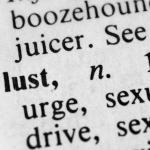In this series I am looking at some common starting points for making moral decisions. These starting points, in spite of being common, are not good starting points. Rather, they are starting points that themselves are immoral or irrational is some way. Because they are either immoral or irrational, they cannot lead to moral or rational ends. In the previous two posts, I pointed out problems with starting a moral decision making process from a place of fear and from a place of fraud, or deception. Now I will look at acting out of a hope for personal gain, or as Alasdair MacIntyre puts it, from “bribery”(though I am not taking bribery here in a strictly legal sense).
In other words, what problems face us if we start a moral deliberation with the undue accumulation of money as our starting point?
Acting from Personal Gain (Bribery)
You cannot love both God and mammon. This was said most authoritatively by, well, by God! Jesus’ own words, recorded in Matthew’s Gospel (6:24), tell us that no one can serve both God and Mammon. One of Jesus’ earliest followers was inspired to write the same true statement in this way, “love of money is the root of all evil” (1 Tim 6:10). This shows a wonderful congruence between Paul and Jesus, a congruence that some Christians try to sever (usually with regard to sexual morality).
The historical record is of course replete with man’s greediness for material wealth and voracious appetite for monetary gain. Nations have literally risen and fallen over the decadence of their rulers, just as local communities have suffered from corruption in their state and county governments. Households fall apart as well, as the thirst for money and luxury drive families to extremes which enslave them to the act of ‘money making.’ Athletes and movie stars are also notorious for their insatiable lust for money and luxury. Given what athletes and actors actually do, the fact they are paid so handsomely is still something that boggles my mind!
It is not money itself, however, that is evil. Rather, it is the disordered love of wealth that, if taken as one’s moral starting point, leads to all kinds of evils. This love of money corrupts all aspirations to moral goodness. This is regardless of whether it is couched in a religious context, e.g., the Papacy of the Borgias or the Prosperity Gospel of today, or in a secular one, e.g., political cronyism or marketplace corruption. Christians should have no fear of earning money, even a lot of money, so long as the desire for it is rightly ordered. This means that when it comes to moral deliberations, the making of or keeping of money is not a primary concern or an ultimate goal. Money in the hands of the wise man can produce all kinds of social and even spiritual goods. Wealth in the possession of the righteous steward can serve many of God’s purposes on earth.
Love of Money in the Church
The love of money in the church, however, is a special kind of atrocity. Throughout its history money has bankrupted many a congregation. In Luther’s day doctrine was abused for the sake of sending riches to Rome for the building of St. Peter’s Cathedral. While God ultimately used the abuse of indulgences to motivate a young Luther to nail his reformational theses to the Wittenberg door, the damage to human souls was nevertheless real. Further, the manipulation of doctrine was tragic to the life and reputation of God’s Church, an ignominy that resounds to this day.
More recently what was once a covert sin in many Protestant churches (the pastoral love for money), has been made shamelessly explicit by “prosperity” and “health and wealth” preachers, men and women who preach a false christ. This is a christ who enters into the world not to suffer and die for the sins of mankind, but who pays sinners’ debt so they might become materially rich. It is a vile corruption of religion that permeates not only the American landscape but dominates many parts of Africa, South America and Asia, where materially poor people fall prey to the lie of Mammon.
In his incisive book, The Subversion of Christianity, Jaques Ellul highlights the power of Mammon, which he considers one of the six main “powers and principalities” that the Bible speaks of (the others are: the prince of the world, the prince of lies, Satan, the devil, and death). Of the first “power,” Mammon, Ellul says:
Mammon is money imposing itself as a law of relationship: exchange, buying and selling, nothing for nothing, everything to be bought and sold. This is integrally and totally contrary to grace….The spirit of it has made its way into the church, where sometimes grace has been put on sale [like Tetzel’s indulgences], or the church has become a center of rapine and self-enrichment, or…it is so obsessed with its financial problems that all its other concerns and functions take second place.
This last form of love of Mammon might seem less harmful, but it is almost the status quo for many mainline churches, especially in Europe today. In short, the obsession over money becomes the means by which we interact as human beings. Because an exchange is required, money works against grace.
Money as A Demonic Power
As I pointed out with fear and fraud, however, money should not be seen as merely a material good that attracts men. Ellul clarifies that when Christ speaks of Mammon, He is not talking just about the coinage of ancient Rome. He is speaking of a spiritual power, a demonic reality.
Ellul continues,
But what we see here is not just the world of money itself or our subjective desire for it. It is in truth a demonic power that has given money the ability to change everything that ought to be free and open grace into bitter conquest, possession, and obsession.
The problem of money is closely associated with the spiritual status of human beings. The powers and principalities that Paul speaks of in his letter to the Ephesians are not friends of God’s crowing achievement. The power of Mammon causes us to overvalue the act of “having” as opposed to the state of “being.”If we focus on possessing aspects of God’s creation as opposed to being in relationship with them, then we give ourselves over to the spirit of Mammon.
Confusing possessing with being inevitabley turns back on the one possessing. In seeking to own or possess some thing, we gradually become owned or possessed by the things we seek to hold on to. Commenting on the work of Catholic existentialist Gabriel Marcel, F.H. Heinemann puts it this way:
Objects which we possess, houses, books, factories, gardens, or ideas and opinions which we regard as our ‘possessions’, in a specific sense ‘have’ us. We are in danger of being imprisoned or devoured by them. People concentrating on having are in danger of becoming captive souls cut off from other persons and not responding to their ‘presence.’
The spirit of Mammon can cause us to equate our value, our identity, with what we possess or how much of it we possess. In doing so, it further causes us to forget, deny or suppress the source of our true value, namely God Himself. Once this occurs, we lose sight of the fact that we are foremost made in God’s image, instead seeing our image as being dependent upon Mammon. And so Mammon now owns us, enslaving us to his evil will. For this reason, when Jesus says we cannot serve both God and Mammon, he refers to Mammon in terms of a master-slave relationship. Either we are servants of God’s will or we are slaves of Mammon. The choice is ours.
Conclusion: The Fear of the Lord, Not the Love of Mammon, Must Guide Us
There are many practical concerns about money. And while any good steward of the material wealth God allows us to have will take those into consideration, to start with money, or comfort, as the impetus for moral decision making is to start from a place of inherent sinfulness. Fear of the Lord and the love of money (or fear of not having money) are, as Jesus warned us, mutually incompatible orientations of the will. If the latter takes precedent over the former, only evil can ensue. In the next post I will look at the final (false) starting point for moral decision making, namely, seduction.














